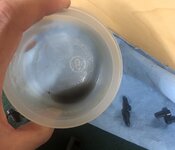Bearwhisky
WKR
- Joined
- Dec 7, 2019
- Messages
- 933
Does vibration loosen screws? Do small screws in other fields where they must not loosen use threadlocker or do they go bare?
Scope manufacturers do not want customers complaining of rings binding up erectors. Ring manufacturers do not want customers complaining of rust on screws or rings, nor of stripped screws, nor of marring on tubes. Both generally state a torque spec that will not hold scopes from slipping in rings due to that. If they will do that, I wouldn’t put so much faith in them having absolute zero movement in mounts in mind over warranty complaints.
Neither scope nor mount manufacturers pay any attention about long term zero retention, nor have any clue what is required to maintain a static zero- how would they? Do you believe there is a division at Tally or Badger that shot five thousand rounds through fifty rifles each torqued but not degreased or thread locked, and fifty rifles for five thousand rounds each degreased and with thread locker and determined which had fewer issues? Do you believe Leupold, Vortex, or Zeiss did so? Don’t listen to some guy in the internet- you could always listen to Spuhr and have a coat of oil on each screw.
Where and how do you believe the manufacturers have learned that not degreasing and thread locking works better for a zero retention?
Do you loc tite your lug nuts?
Sent from my iPhone using Tapatalk

